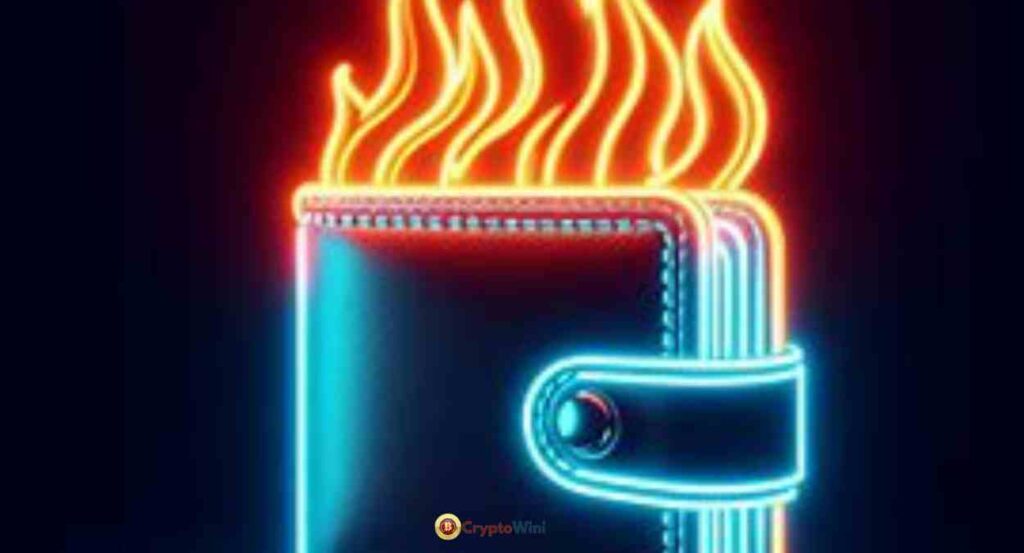{ hot wallets, risks of cryptocurrency, risks of a software wallet, software wallet, best hot wallets, safest crypto, how are cryptocurrency hot wallets different from cold wallets, hot wallets crypto, best crypto hot wallets }

Understanding Cryptocurrency Wallets: Exploring the Dynamics of Hot Wallets
A cryptocurrency wallet allows you to securely store, send, and receive digital currencies like Bitcoin and Ethereum. Just like you keep cash in a physical wallet, crypto wallets hold your cyber money.
There are two main types of cryptocurrency wallets: hot wallets and cold wallets. Hot wallets are connected to the internet, similar to how your online bank account is always linked online. This allows convenient access to view balances and make transfers from anywhere using your phone, computer, or tablet. However, the tradeoff is hot wallets carry certain risks since they are connected online.
Think of it like carrying your physical wallet in your pocket versus locking it in a safe at home. Cold wallets stay offline for enhanced security but aren’t as easily accessible.
This guide will walk through the key information everyone should understand about cryptocurrency hot wallets, including how they work, different types, safety considerations, vulnerabilities, and how hot wallets compare to cold wallets.

Introduction to Hot Wallets
Cryptocurrency wallets are necessary for conducting transactions and storing your digital assets securely.
They come in two main forms:
- Hot wallets – Connected to the internet
- Cold wallets – Stored offline
Hot wallets make it convenient to quickly access your holdings, check balances, and make transfers or payments. The tradeoff is increased vulnerability compared to cold storage.
When setting up a cryptocurrency account on an exchange like Coinbase or Kraken, you are automatically given a hot wallet managed by that exchange to hold your assets. There are also many standalone hot wallet apps and software wallets like Exodus, Jaxx, and Copay.
The core functionality of any hot wallet includes:
- Generating a wallet address to receive crypto
- Securely storing private keys that provide access
- Allowing you to view account balances
- Sending and receiving transactions on the blockchain
Hot wallets act as the interface that lets you easily participate in the crypto ecosystem. Next, we’ll explore exactly how they work under the hood.

How Hot Wallets Work
To understand hot wallets, you need to grasp the basics of how cryptocurrency storage operates:
- Each coin is associated with a public key (wallet address) and a private key (secret passcode).
- The public key allows others to send coins to your wallet.
- The private key provides proof you own those coins.
- Whoever has the private key has full control over the cryptocurrency.
A hot wallet holds these encrypted public and private keys, allowing you to access and manage your digital assets. The keys provide authorization to send and sign transactions on the blockchain.
The main distinction between a hot wallet and a cold wallet is the internet connectivity. Hot wallets are constantly connected online so you can quickly check balances and make transfers. Whereas cold wallets purposefully remain offline for enhanced security.
Now let’s explore the various types of hot wallets available.

Types of Hot Wallets
Now let’s discuss about types of hot wallets. These are a few common categories of hot wallets:
Web-Based Hot Wallets
These are accessed through a website, like:
- MetaMask – Browser extension wallet for Ethereum and ERC-20 tokens
- MyEtherWallet – Open source interface for creating Ethereum wallets
The main advantage of web-based wallets is convenience. You don’t have to download software and can access your wallet anywhere. However, being browser-based also increases vulnerabilities.
Mobile Hot Wallets
These are apps downloaded onto your smartphone or tablet, such as:
- Coinbase Wallet – App to store crypto and make dapp transactions
- Trust Wallet – Mobile wallet supporting many cryptocurrencies
- Edge Wallet – Multi-currency mobile wallet with enhanced security
Mobile apps provide the convenience of accessing your crypto on-the-go. But your phone can be lost or infected with malware.
Exchange Hosted Hot Wallets
When you open an account on a popular crypto exchange like Coinbase, Binance, or Kraken, you are automatically given a hot wallet to deposit, trade, and withdraw funds. This offers simplicity but entrusts custody to the exchange.
The main takeaway is there are many hot wallet options with their own pros, cons, and security considerations. Do your own research before choosing one. Next, we’ll go over some special usage considerations for hot wallets.
Special Usage Considerations for Hot Wallets
While the accessibility of hot wallets is useful, it also warrants caution.
Here are some tips for securely handling your hot wallet:
- Only keep small amounts of crypto in your hot wallet sufficient for transactions
- Make regular backups of your wallet in case devices are lost or damaged
- Use extremely complex and unique passwords that would be difficult to crack
- Enable two-factor or multi-factor authentication for additional security
- Be wary of phishing attempts trying to steal wallet login details
- Consider using a hardware wallet like Ledger or Trezor for additional protection
A good practice is to use your hot wallet exclusively for current crypto needs while storing the bulk of your assets in cold storage. This balances usability with limiting exposure.
Now let’s go over the potential risks and vulnerabilities of cryptocurrency hot wallets.

The Risks of Hot Wallets
The main security downside of hot wallets stems from their constant connection to the internet. This online accessibility makes them much more vulnerable to hacking compared to cold wallets:
- Malware or viruses could infect a hot wallet and secretly steal private keys and seed phrases.
- Phishing attacks may scam users into unintentionally revealing wallet login details and passwords.
- Poor encryption or lax security settings can provide opportunities for unauthorized access.
- If a hot wallet provider is hacked, customer accounts and funds are put at risk.
Some examples of past hot wallet hacks include:
- Mt Gox (2014) – 850,000 bitcoins stolen worth $460 million
- Bitfinex (2016) – 120,000 bitcoins stolen worth $72 million
- NiceHash (2017) – $64 million stolen by hackers
These incidents highlight the susceptibility of hot wallets. While hacking a well-secured hot wallet is difficult, it’s not impossible. Next, we’ll go over ways to enhance the safety of your hot wallet.
Securing Your Hot Wallet
The first step is choosing a trusted provider if using a third-party hot wallet. Look for an established company with a solid reputation.
Here are some tips to keep your hot wallet safe and secure:
- Use an extremely complex password that would be difficult to crack. The more characters, the better.
- Enable two-factor or multi-factor authentication (2FA or MFA). This uses an extra step like an SMS code to verify your identity.
- Be wary of phishing attempts via email or text that try to steal your login credentials.
- Only enter wallet details on the provider’s legitimate website. Bookmark it.
- Use a dedicated email address just for your hot wallet accounts.
- Install anti-virus software and other endpoint security to block malware.
- Avoid accessing your hot wallet on public WiFi or shared devices.
- Use a VPN for additional privacy when accessing your wallet online.
Carefully following security best practices reduces the risk substantially. But for long-term storage, cold wallets are usually a better choice.

Should You Store Investments in a Hot Wallet?
Given their convenience for transactions, some users are tempted to also utilize hot wallets for investing and long-term holdings. However, this is generally not recommended.
For holdings meant to be stored for months or years, hot wallets pose vulnerabilities that make them suboptimal:
- Constant internet connection increases susceptibility to hacking over long periods.
- Companies holding the private keys could be hacked.
- Holdings are at risk if the device storing the hot wallet is damaged, lost, or stolen.
For most investors, the wise choice is to select cold storage for the bulk of your cryptocurrency that is not actively being traded or spent:
- Hardware wallets like Trezor and Ledger offer offline storage and backup options.
- Paper wallets involve printing out private keys to be kept in a secure location.
- Deep cold storage takes assets completely offline in a physical vault.
The minimal convenience tradeoff is worthwhile to secure holdings from online threats.
Now let’s directly compare the characteristics of hot wallets versus cold wallets.
Hot Wallet vs Cold Wallet
Let’s summarize the key differences between these two cryptocurrency storage methods:
| Feature | Hot Wallet | Cold Wallet |
|---|---|---|
| Internet Connection | Always connected | Offline |
| Accessibility | Immediate | Delayed |
| Transactions | Instant | Manual steps needed |
| Primary Uses | Transactions, actively used crypto | Long-term holdings |
| Security Level | Lower | Much higher |
| Custody | Can be self-hosted or third party | Full user control |
| Examples | Coinbase Wallet, Exodus | Trezor, Ledger, Paper wallets |
Hot wallets shine when it comes to convenience and usability. But cold wallets are widely considered safer for large amounts or long-term holdings. A balanced approach is using hot wallets for a portion of funds meant for transactions, while cold storing the bulk of holdings.
This leads to the question – how safe are hot wallets ultimately?

Are Hot Wallets Safe?
Hot wallets require more precautions but are generally secure when properly handled. The main considerations are:
- Only keep a small portion of your total holdings in hot wallets to limit risk exposure.
- When used for transactions, transferring small amounts poses little threat.
- As long as the vast majority of your cryptocurrency is in cold storage, the vulnerability of hot wallets decreases substantially.
Protocols like SSL encryption, 2FA authentication, anti-phishing measures, and other security features also improve safety when enabled.
However, hot wallets will always carry more inherent risks than cold storage. Your tokens are only as secure as the wallet, device, and provider protecting them.
Some final thoughts to keep in mind:
- Software hot wallets are convenient but more prone to hacking than hardware wallets.
- Web-based hot wallets add the risks of browser vulnerabilities.
- Mobile wallets can be lost along with your phone or infected by mobile malware.
- Exchange-hosted wallets entrust custodial risks to the exchange.
- Self-hosted wallets require you to be extremely careful and security savvy.
With the right precautions, hot wallets provide a solid option for usability, but they should not be treated as indestructible.
Frequently Asked Questions
What is the difference between a hot wallet and a cold wallet for cryptocurrency?
The main difference is that hot wallets are connected to the internet while cold wallets remain offline. Hot wallets allow you to quickly access funds and transact but have more vulnerabilities. Cold wallets keep your crypto offline for enhanced security.
What are the risks of using a cryptocurrency hot wallet?
Potential risks include hacking, theft of private keys, phone loss or theft, and malware infecting a hot wallet. Being online makes them more susceptible to attacks.
Is a software hot wallet or a hardware hot wallet more secure?
Hardware wallets like Trezor and Ledger are more secure since they store keys offline. Software hot wallets have more exposure to online threats.
Can a mobile crypto hot wallet get hacked?
Mobile hot wallets face threats like malware, spyware, and mobile viruses which could allow hackers to steal funds. Proper security precautions reduce this risk.
Are web-based cryptocurrency hot wallets safe to use?
Web wallets that store keys online are vulnerable to threats like phishing and hacking. Caution is warranted, but they can be used safely with proper security precautions.
How do I keep my cryptocurrency hot wallet safe and prevent hacking?
Tips include using complex passwords, enabling 2FA, limiting access to devices, being wary of phishing attempts, using encrypted networks, and having separate emails for wallet accounts.
What is the most secure type of hot wallet for cryptocurrency?
Hardware wallets like Ledger and Trezor offer enhanced security by storing private keys offline while allowing online monitoring and access.

Conclusion
Hot wallets play an important role in the cryptocurrency ecosystem by facilitating transactions and providing easy access to funds. However, their internet connectivity also increases vulnerabilities that are important to address.
This guide covered the key basics everyone should know:
- How hot wallets operate using private keys, public keys, and wallet addresses.
- Types of hot wallets like mobile, web, and exchange-hosted options.
- Usage considerations like limiting amounts, backups, and enhanced security.
- Potential hacking risks are reduced but still present with hot wallets.
- Comparisons to cold wallets show the tradeoffs between accessibility and security.
The bottom line is hot wallets are reasonably safe when used properly, but most suitable for transactions rather than long-term investments. By combining hot wallets for active use and cold storage for holdings, you can optimize for both usability and security in your cryptocurrency needs.
Disclaimer:
The content on Cryptowini is for informational purposes only and should not be construed as professional financial advice. Use caution and conduct your research before making investment decisions regarding cryptocurrencies or hot wallets.
Cryptocurrency investments carry inherent risks like volatility and loss of capital. We only recommend utilizing hot wallet solutions from established, reputable providers with a track record of security.
Also Read :
Trump Crypto: How Politics Shapes Your 2025 Investments!
Crypto Wallet Guide: Best Secure Storage Options for 2025!
Bitcoin 2025: Will It Hit $200K? Experts Weigh In
Crypto News 2025: You Must Know What’s Hot And What’s Not
Best Crypto to Invest in 2025: Top Picks & Insights for Big Wins!
How To Buy Cryptocurrency In India Legally And Securely: The Complete 2024 Guide
Crypto Exchange OKX Secures Regulatory Approval In Dubai To Offer Crypto Services
Crypto FOMO Warning Reissued Ahead of Bitcoin ETF Frenzy – What Investors Need to Know
Coinex Crypto Exchange – A Thorough Review And Guide For 2024
How Would A BlackRock Bitcoin Spot ETF Disrupt The Crypto Market In 2024?
Is Riot Blockchain The Next $500K Stock? RIOT Stock Forecast For 2024 And Beyond






























